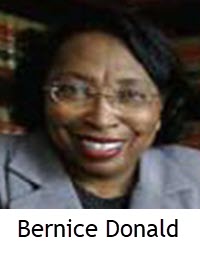Abstract
Excerpted from: Bernice B. Donald and Pablo J. Davis, "To this Tribunal the Freedman Has Turned": The Freedmen's Bureau's Judicial Powers and the Origins of the Fourteenth Amendment, 79 Louisiana Law Review 1 (Fall, 2018) (264 Footnotes Omitted) (Full Document)

Senator Henry Wilson (R.-Mass.), Feb. 1, 1866.
If it be asked whether the creation of such a tribunal within a State is warranted as a measure of war, ... [a]t present there is no part of our country in which the authority of the United States is disputed .... Undoubtedly the freedman should be protected, but he should be protected by the civil authorities .... His condition is not so exposed as may at first be imagined.
President Andrew Johnson, Veto Message, Second Freedmen's Bureau Act, Feb. 19, 1866.
As the horror of the Civil War drew to a close, leaving more than a half-million dead in a population of only 30 million inhabitants, a tremendous toll of physical and psychic devastation, a president assassinated, and secession and slavery both defeated, a monster rampaged through the South. Confederate General Wade Hampton, the scion of a powerful South Carolina slaveholding family, conjured visions of a grotesque and dreadful leviathan: "The war which was so prolific of monstrosities, new theories of republican government, new versions of the Constitution ... gave birth to nothing which equals in deformity and depravity this Monstrum horrendum informe ingens."' The Democratic Party made a central issue of attacking the "fabulous monster," upon which they looked "with a religious though insane horror." Gideon Welles, President Johnson's staunchly anti-Reconstruction Secretary of the Navy, spoke of it as an appalling "engine ... a governmental monstrosity."
million inhabitants, a tremendous toll of physical and psychic devastation, a president assassinated, and secession and slavery both defeated, a monster rampaged through the South. Confederate General Wade Hampton, the scion of a powerful South Carolina slaveholding family, conjured visions of a grotesque and dreadful leviathan: "The war which was so prolific of monstrosities, new theories of republican government, new versions of the Constitution ... gave birth to nothing which equals in deformity and depravity this Monstrum horrendum informe ingens."' The Democratic Party made a central issue of attacking the "fabulous monster," upon which they looked "with a religious though insane horror." Gideon Welles, President Johnson's staunchly anti-Reconstruction Secretary of the Navy, spoke of it as an appalling "engine ... a governmental monstrosity."
What was this "monster" and why was it so widely hated? It was not the occupying Union Army, nor the former slaves, now freedpeople, nor even the Republican Party, but rather a federal government agency that had been in existence for barely one year: the Bureau of Refugees, Freedmen, and Abandoned Lands, known as the Freedmen's Bureau ("Bureau"). George B. Shanklin, a Democratic Congressman from Kentucky, strikingly expressed the singular place given to this entity as a paramount symbol of evil for postwar White Southerners: advocating for the prompt restoration of political rights to participants in the Confederate cause, Shanklin envisioned the benefits of such a policy: "harmony and prosperity [restored] ... to a distracted country; the military removed to the frontier and coast; and, above all, the Freedmen's Bureau, the manufacturer of paupers and vagabonds, the fruitful source of strife, vice and crime, dispensed with, and an exhausted treasury relieved from the burden of its support."
Born out of the chaos of war, the Freedmen's Bureau was a unique entity created by Congress within the War Department shortly before Lincoln's death, Johnson's assumption of the presidency, and the war's end. Congress charged the Bureau with assisting the freedmen in their transition from slavery to free labor and, later, citizenship. The almost inconceivably vast scope of its duties included emergency relief, education, medical care, transportation, administering confiscated or abandoned lands, implementing and overseeing a new system of agricultural labor contracts, and more. The Bureau's task has been characterized as nothing less than "creating a new way of life for American Negroes, most of whom lived in the South and had been slaves." But, fashioning that "new way of life" could not help but involve and affect White Southerners also, reshaping the long-established, hierarchical relationships of domination they had exercised over African-Americans. Whites, therefore, would have quite a lot to say about the Bureau's work.
Of the Bureau's many fields of action, however, none stirred up as much hostility as its judicial functions. W.E.B. DuBois, the pioneering African-American sociologist and early historian of the Bureau, referred to "administer[ing] justice between man and former master" as "[t]he most perplexing and least successful" of the Bureau's tasks.
This Article explores the Freedmen's Bureau as a significant part of the context of the Fourteenth Amendment's enactment. It does so by looking at the Bureau's judicial powers, and their grant, exercise, and political effects. The Article will proceed in four parts:
Part I briefly considers the Bureau's wartime genesis.
Part II, concerned mainly with events in 1865, looks at the exercise of the Bureau's judicial powers under its original statute and the ongoing battles over jurisdiction.
Part III, concerning events mainly in 1866, explores the political fight over the proposed Second Freedmen's Bureau Act, which led to a complete break between Congressional Republicans and President Johnson.
Part IV will offer brief concluding thoughts, relating issues revealed in Parts II and III to the broader question of the Bureau's connection with the Fourteenth Amendment.
. . .
The Freedmen's Bureau courts represented a historic experiment--an attempt to establish a regime to administer justice to a disenfranchised and despised group of people during a hostile period in history, when the larger White Southern society believed them to be undeserving of freedom, human dignity, respect, and certainly equality. For a culture that extolled the virtue and propagated the narrative of white supremacy, according recently freed African-Americans the ability to testify in courts against Whites, or even exercise de minimis accoutrements of the qualities of citizenship, represented a threat to the social order White Southerners sought to restore and defend. The Southern civil courts, steeped in Southern cultural norms, accorded white supremacy priority over the rule of law. That overarching hegemony posed an existential threat to the independence of the Bureau courts. Regional cultural norms, combined with hostility from the federal Executive Branch as well as fractional support from Congress, amounted to a formula for anemic results, which left African-Americans vulnerable and exposed.
The experience of the Freedmen's Bureau courts exemplifies the challenge courts face to ensure justice in both peaceful and tumultuous times. Courts must assure unpopular causes, oppressed people, and racial and cultural minorities that during times of war and of peace, periods of protest and calm, and times of strong leaders who may be hostile to their rights, civilians can count on the courts to ensure justice and to protect the rule of law, without fear or favor. The actions of courts must withstand harsh scrutiny, in both the glaring light of the present and the cool light of hindsight. Today, African-Americans have the highest distrust in courts to deliver just and fair outcomes. Numerous studies have shown that unconscious negative stereotypes and racial bias still pervade our justice system at every level. Studying the functioning of Freedmen's Bureau courts in the immediate aftermath of the Civil War provides an important foundation for further examination of where the country stands as a racially and ethnically diverse society 150 years after the ratification of the Fourteenth Amendment. In the 21st century, no less than amidst the ruins of this country's great fratricidal conflict, courts must stand strong as a beacon of justice and equality for all.
Footnotes
United States Circuit Judge, United States Court of Appeals for the Sixth Circuit.
Of Counsel, Dinsmore & Shohl LLP; Law Clerk to the Hon. Bernice B. Donald, United States Court of Appeals for the Sixth Circuit


